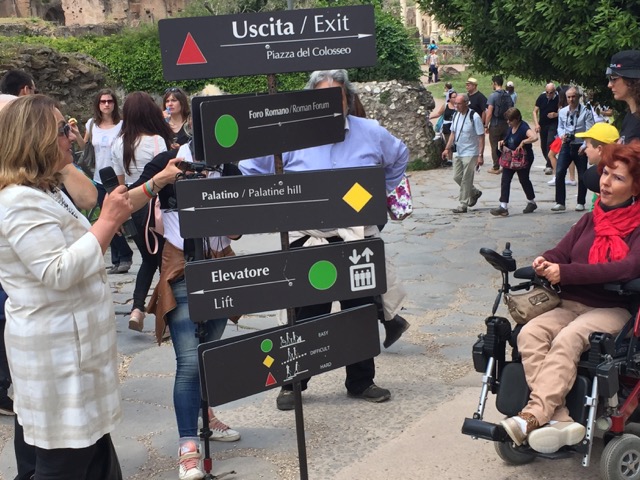ELEVATOR Project, Accessible Tourism Training Workshop, Rome
Share on social media
Torricola, Rome. 8 May 2017. The ELEVATOR project partnership is holding a Workshop addressing “Education of tourist guides on accessible tourism".
 Torricola, Rome. 8 May 2017. The ELEVATOR project partnership is holding a Workshop addressing “Education of tourist guides on accessible tourism".
Torricola, Rome. 8 May 2017. The ELEVATOR project partnership is holding a Workshop addressing “Education of tourist guides on accessible tourism".
Thematic workshop summary report
The workshop was organised inviting Associations of Tourist guides and tourist guides themselves to discuss, together with the partnership the state of the art of training for tourist guides in the countries participating in ELEVATOR project and the situations, faced by the tourist guides, which would require specific training with the double objective of allow them to intervene properly in case of criticalities during the tour and to have a better knowledge of the requirements expressed by the tourists with access needs.
Each project partner presented the situation of existing training offer in the different countries and the debate with the Italian representatives allowed to outline the Italian status of education/training in this field.
The workshop was attended by 19 persons.
The contribution of the tourist guides to the discussion allowed also to consider specific training for specific visitors categories, like the experience of the Association Museum, which is specialised in offering guided tours for people with visual impairments. For this specific requirement the training offer of Museo Omero, in Marche Region, has also been mentioned as available.
Another specific training offer is the one provided to and by deaf guides for people with hearing impairments.
There are some improvements on the Museums offer as many of them now allow visitors with visual impairments to touch object; on the other hand some, like the Vatican Museums, require that a group including visitors with disability is split and that the non-disabled participants follow another internal route. This is of course causing problems in the guiding procedure as some visitors are left without a guide.
Besides these few experiences, the one of the association of naturalistic guides, who couldn’t participate at the very last minute, is also important as the many training activities they do, are developed with the support of the FISH (an Italian umbrella organization of association of people with disabilities). They have asked to be informed about the project development.
After a very intensive discussion and exchange of information on the status of the art of available training offers, which seem to be rather absent in any country, the conclusions and the suggestion to be brought forward also through the products of the project, were:
- Qualifications of tourist guides on the issues of visitors with specific requirements is a must since no regular programming initiative are available in all the countries.
- Guide are willing to pay for qualified training courses and normally prefer face-to-face offers to take advantage of “touching” the reality of visitors with disabilities and take advantage of simulations and role play. The preferred period is during the low season.
- Training is a necessity also to maintain and improve the quality of the guiding offers, which have been seriously reduced by the deregulation of certification, at European level.
- It could be important to inform and influence politicians towards a complete recognitions of the specialized skills that a tourist guide must have.
- Politicians and public administration in general must be informed and involved so that the managers and staff working in the tourist sector understand the importance of the flows of information among all the actors of the tourist service chain. Tourist guides are often faced by critical unforeseen situations and no one simply cared to inform them.
- Reliable information on how and where to find provisions for the requirements of visitors with disabilities are also very important, together with the fact that what is available MUST be possibly used ( e.g Use of public accessible toilets).
At the conclusions of the workshop Jana, Project Leader, thanked the participants and said that they will be informed on the project’s developments and on the availability of the material that ELEVATOR will produce.
